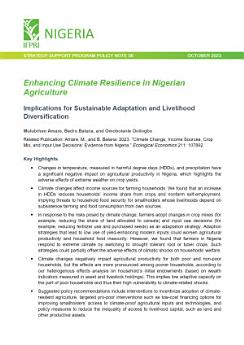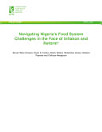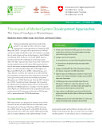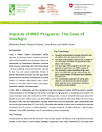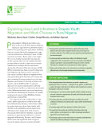Enhancing climate resilience in Nigerian agriculture: Implications for sustainable adaptation and livelihood diversification
About this ebook
Changes in temperature, measured in harmful degree days (HDDs), and precipitation have a significant negative impact on agricultural productivity in Nigeria, which highlights the adverse effects of extreme weather on crop yields.
Climate changes affect income sources for farming households. We found that an increase in HDDs reduces households’ income share from crops and nonfarm self-employment, implying threats to household food security for smallholders whose livelihoods depend on subsistence farming and food consumption from own sources.
In response to the risks posed by climate change, farmers adopt changes in crop mixes (for example, reducing the share of land allocated to cereals) and input use decisions (for example, reducing fertilizer use and purchased seeds) as an adaptation strategy. Adaption strategies that lead to low use of yield-enhancing modern inputs could worsen agricultural productivity and household food insecurity. However, we found that farmers in Nigeria respond to extreme climate by switching to drought tolerant root or tuber crops. Such strategies could partially offset the adverse effects of climatic shocks on households’ welfare.
Climate changes negatively impact agricultural productivity for both poor and non-poor households, but the effects are more pronounced among poorer households, according to our heterogenous effects analysis on household’s initial endowments (based on wealth indicators measured in asset and livestock holdings). This implies low adaptive capacity on the part of poor households and thus their high vulnerability to climate-related shocks.
Suggested policy recommendations include interventions to incentivize adoption of climate-resilient agriculture, targeted pro-poor interventions such as low-cost financing options for improving smallholders’ access to climate-proof agricultural inputs and technologies, and policy measures to reduce the inequality of access to livelihood capital, such as land and other productive assets.
